Internationale Integration der Finanzmärkte, Wirtschaftswachstum und Finanzstabilität
Die internationale Integration der Finanzmärkte ist einer der wichtigsten weltwirtschaftlichen Trends der Gegenwart. Diese Forschungsgruppe analysiert die Rolle der internationalen Finanzintegration für Wirtschaftswachstum und Finanzstabilität.
Aus neoklassischer Sicht erhöht ein integrierter globaler Finanzmarkt das Wirtschaftswachstum, denn er senkt die Kapitalkosten und ermöglicht die Diversifikation von Risiken. Länder mit liberalisiertem internationalen Kapitalverkehr schneiden jedoch nicht unbedingt besser ab als Volkswirtschaften mit Kapitalverkehrskontrollen; und die jüngste Weltfinanzkrise hat sogar dazu geführt, dass sich Finanzmärkte teilweise wieder disintegrieren. Die Neubewertung der Rolle der Finanzintegration für Wirtschaftswachstum und Finanzstabilität scheint also von erheblicher Bedeutung, aus wirtschaftspolitischer Sicht ebenso wie für die akademische Forschung.
Diese Forschungsgruppe soll Antworten auf folgende Fragen suchen: Erstens untersucht die Gruppe, wie die Produktivität von Unternehmen vom Zugang zu internationalem Kapital beeinflusst wird und ob kapitalintensive Sektoren in besonderem Maße von der Liberalisierung des Kapitalverkehrs profitieren. Darüber hinaus untersucht diese Gruppe die strukturellen Transformationsfolgen der finanziellen Integration. Zweitens erreicht internationales Kapital die Realwirtschaft über die Vermittlung durch Finanzinstitute. Die Gruppe analysiert, ob der grenzüberschreitende Kapitalfluss das Verhalten der Banken ändert und insbesondere, wie die Finanzierungslaufzeit, die Struktur und das systemische Risiko beeinflusst werden. Drittens haben internationale Organisationen wie der IWF eine schrittweise Liberalisierung des Kapitalverkehrs vorgeschlagen. So soll die Liberalisierung der Kapitalimporte zeitlichen Vorrang haben vor derjenigen für Kapitalexporte, und die Liberalisierung von Direktinvestitionen soll vor derjenigen von Investitionen in Krediten und Wertpapieren kommen. Es gibt allerdings derzeit noch wenige empirische Arbeiten, die diese Empfehlungen stützen. Die Forschungsgruppe untersucht, ob und wie die Sequenzierung der Kapitalverkehrsliberalisierung für die finanzielle Stabilität von Bedeutung ist.
Forschungscluster
Produktivität und InstitutionenIhr Kontakt

- Abteilung Makroökonomik
Referierte Publikationen

Financial Technologies and the Effectiveness of Monetary Policy Transmission
in: European Economic Review, January 2024
Abstract
<p>This study investigates whether and how financial technologies (FinTech) influence the effectiveness of monetary policy transmission. We use an interacted panel vector autoregression model to explore how the effects of monetary policy shocks change with regional-level FinTech adoption. Results indicate that FinTech adoption generally mitigates the transmission of monetary policy to real GDP, consumer prices, bank loans, and housing prices, with the most significant impact observed in the weakened transmission to bank loan growth. The relaxed financial constraints, regulatory arbitrage, and intensified competition are the possible mechanisms underlying the mitigated transmission.</p>
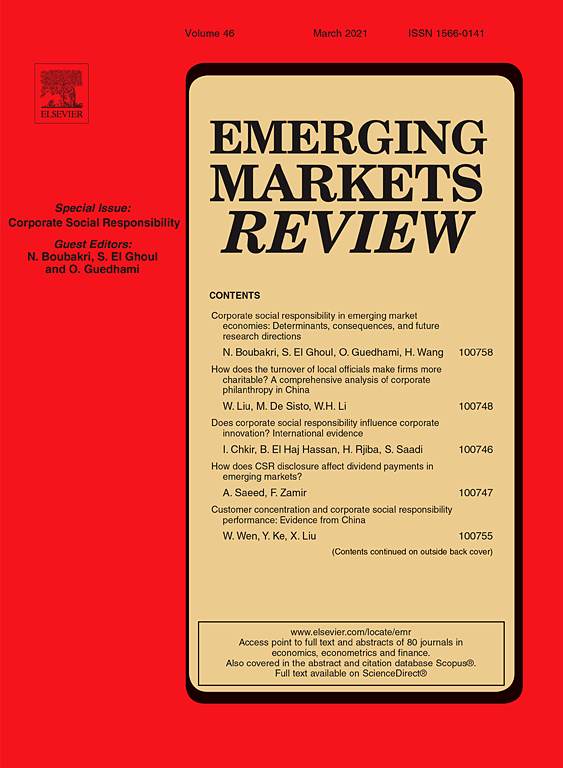
Household Indebtedness, Financial Frictions and the Transmission of Monetary Policy to Consumption: Evidence from China
in: Emerging Markets Review, June 2023
Abstract
This paper studies the impact of household indebtedness on the transmission of monetary policy to consumption using the Chinese household-level survey data. We employ a panel smooth transition regression model to investigate the non-linear role of indebtedness. We find that housing-related indebtedness weakens the monetary policy transmission, and this effect is non-linear as there is a much larger counteraction of consumption in response to monetary policy shocks when household indebtedness increases from a low level rather than from a high level. Moreover, the weakened monetary policy transmission from indebtedness is stronger in urban households than in rural households. This can be explained by the investment good characteristic of real estate in China.
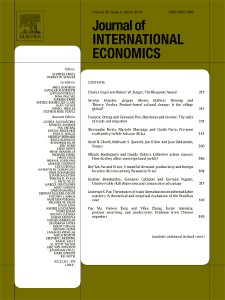
Surges and Instability: The Maturity Shortening Channel
in: Journal of International Economics, November 2022
Abstract
Capital inflow surges destabilize the economy through a maturity shortening mechanism. The underlying reason is that firms have incentives to redeem their debt on demand to accommodate the potential liquidity needs of global investors, which makes international borrowing endogenously fragile. Based on a theoretical model and empirical evidence at both the firm and macro levels, our main findings are twofold. First, a significant association exists between surges and shortened corporate debt maturity, especially for firms with foreign bank relationships and higher redeployability. Second, the probability of a crisis following surges with a flattened yield curve is significantly higher than that following surges without one. Our study suggests that debt maturity is the key to understand the financial instability consequences of capital inflow bonanzas.

Total Factor Productivity Growth at the Firm-level: The Effects of Capital Account Liberalization
in: Journal of International Economics, November 2022
Abstract
This study provides firm-level evidence on the effect of capital account liberalization on total factor productivity (TFP) growth. We find that a one standard deviation increase in the capital account openness indicator constructed by Fernández et al. (2016) is significantly associated with a 0.18 standard deviation increase in firms’ TFP growth rates. The productivity-enhancing effects are stronger for sectors with higher external finance dependence and capital-skill complementarity, and are persistent five years after liberalization. Moreover, we show that potential transmission mechanisms include improved financing conditions, greater skilled labor utilization, and technology upgrades. Finally, we document heterogeneous effects across firm size and tradability, and threshold effects with respect to the country's institutional quality.
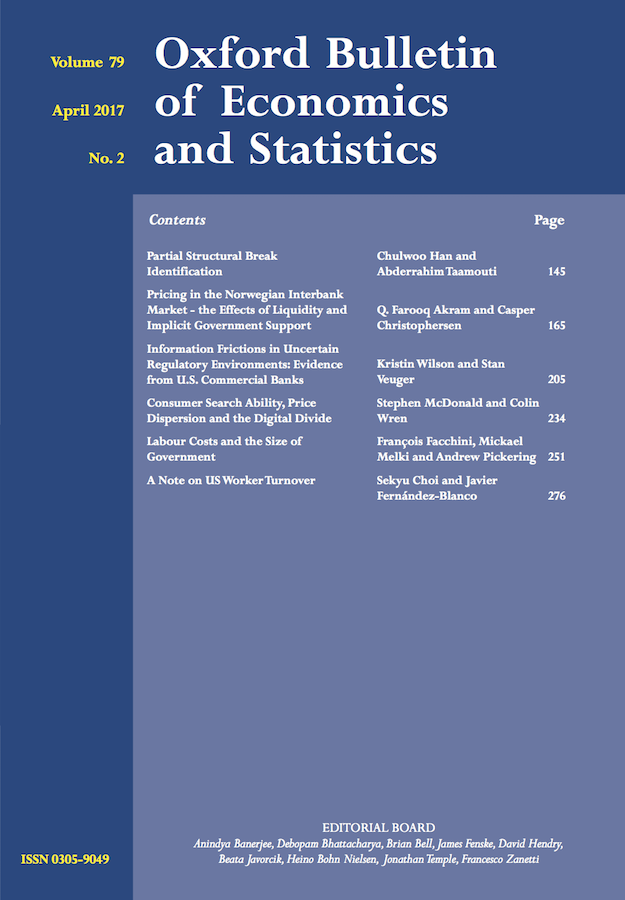
Does Capital Account Liberalization Affect Income Inequality?
in: Oxford Bulletin of Economics and Statistics, Nr. 2, 2021
Abstract
By adopting an identification strategy of difference‐in‐difference estimation combined with propensity score matching between liberalized and closed countries, this paper provides robust evidence that opening the capital account is associated with an increase in income inequality in developing countries. Specifically, capital account liberalization, in the long run, is associated with a reduction in the income share of the poorest half by 2.66–3.79% points and an increase in that of the richest 10% by 5.19–8.76% points. Moreover, directions and categories of capital account liberalization matter. The relationship is more pronounced when liberalizing inward and equity capital flows.
Arbeitspapiere
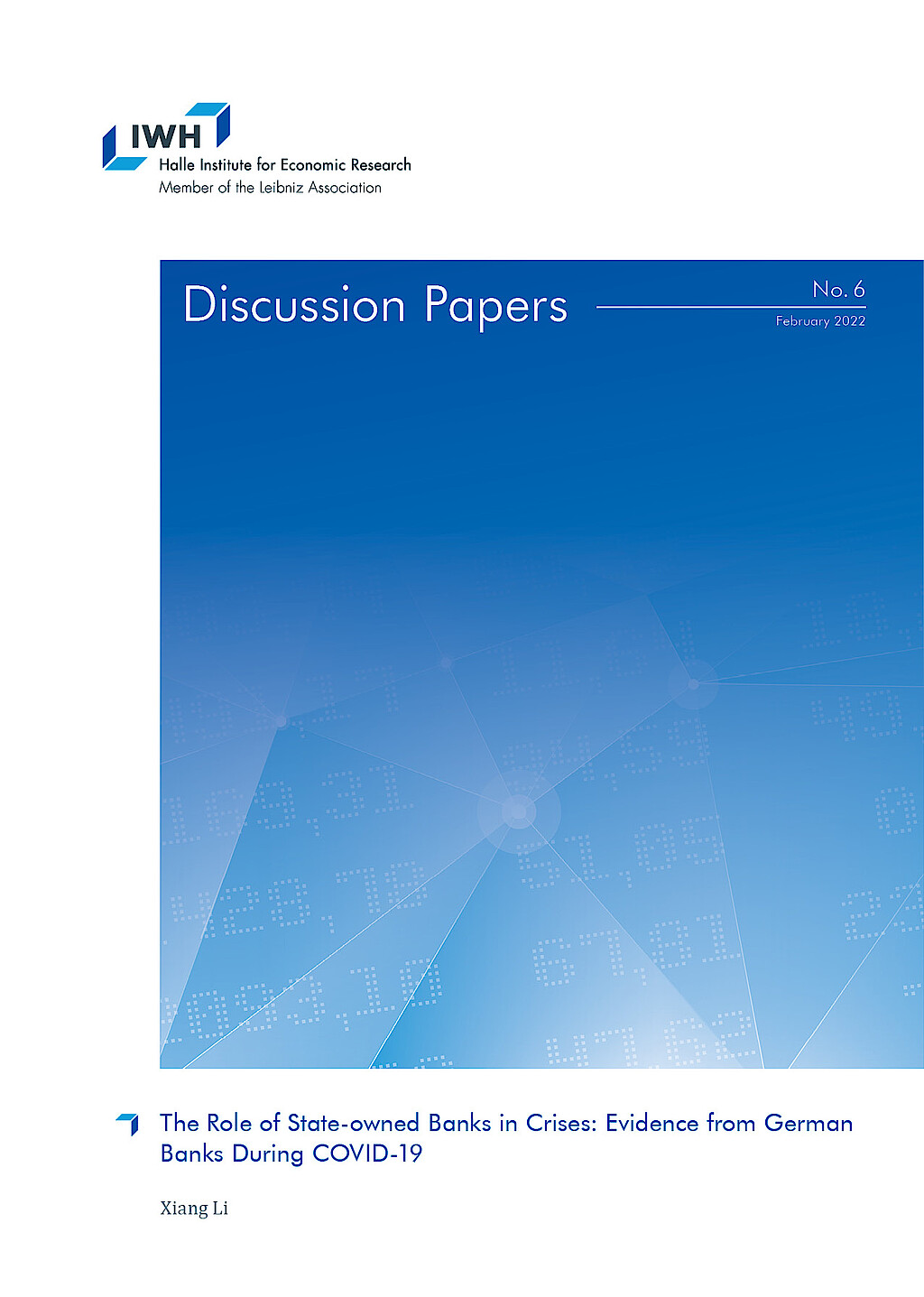
The Role of State-owned Banks in Crises: Evidence from German Banks During COVID-19
in: IWH Discussion Papers, Nr. 6, 2022
Abstract
By adopting a difference-in-differences specification combined with propensity score matching, I provide evidence using the microdata of German banks that stateowned savings banks have lent less than credit cooperatives during the COVID-19 crisis. In particular, the weaker lending effects of state-owned banks are pronounced for long-term and nonrevolving loans but insignificant for short-term and revolving loans. Moreover, the negative impact of government ownership is larger for borrowers who are more exposed to the COVID-19 shock and in regions where the ruling parties are longer in office and more positioned on the right side of the political spectrum.
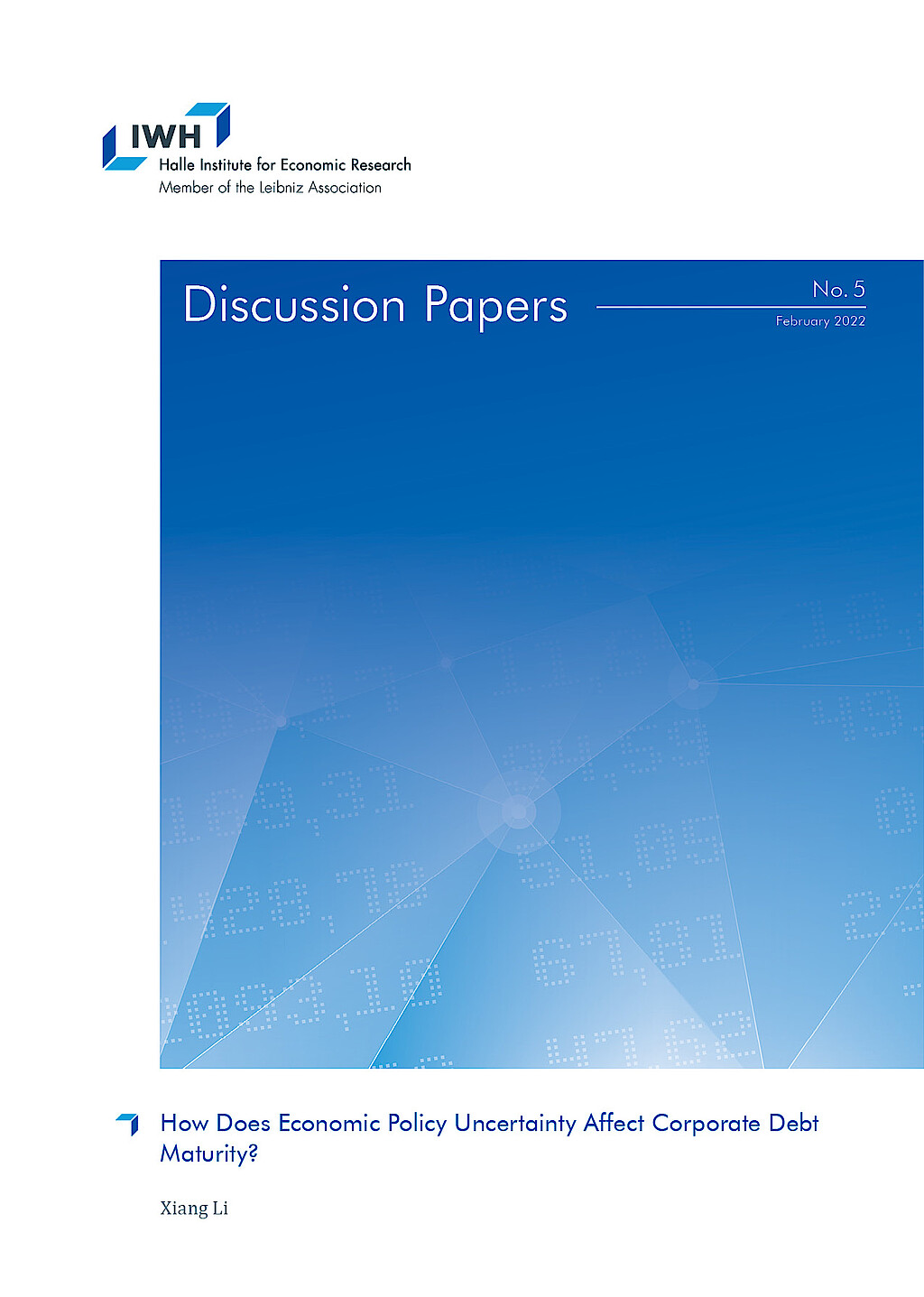
How Does Economic Policy Uncertainty Affect Corporate Debt Maturity?
in: IWH Discussion Papers, Nr. 5, 2022
Abstract
This paper investigates whether and how economic policy uncertainty affects corporate debt maturity. Using a large firm-level dataset for four European countries, we find that an increase in economic policy uncertainty is significantly associated with a shortened debt maturity. Moreover, the impacts are stronger for innovation-intensive firms. We use firms’ flexibility in changing debt maturity and the deviation to leverage target to gauge the causal relationship, and identify the reduced investment and steepened term structure as the transmission mechanisms.
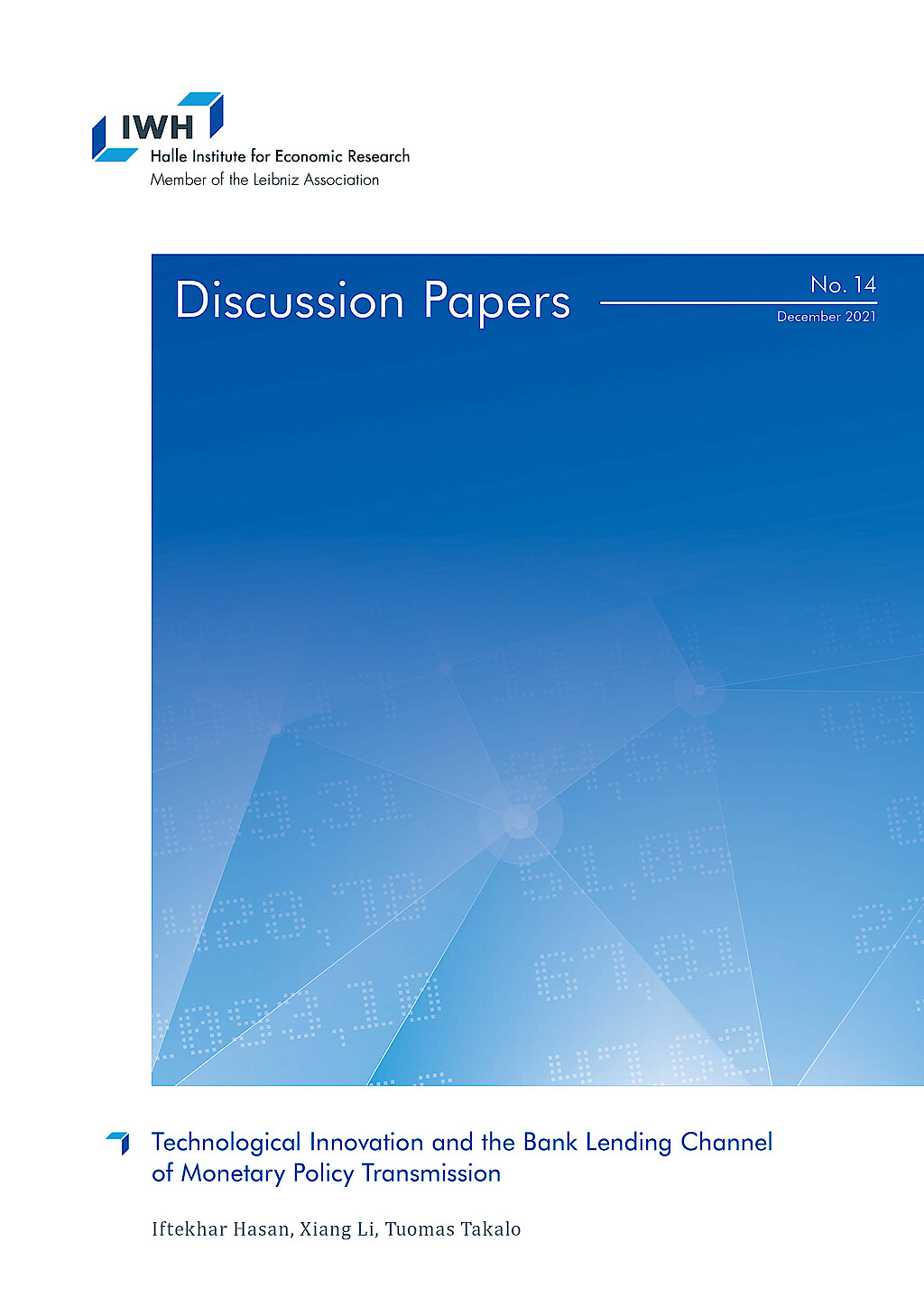
Technological Innovation and the Bank Lending Channel of Monetary Policy Transmission
in: IWH Discussion Papers, Nr. 14, 2021
Abstract
This paper studies whether and how banks’ technological innovations affect the bank lending channel of monetary policy transmission. We first provide a theoretical model in which banks’ technological innovation relaxes firms’ earning-based borrowing constraints and thereby enlarges the response of banks’ lending to monetary policy changes. To test the empirical implications, we construct a patent-based measurement of bank-level technological innovation, which can specify the nature of technology and tell whether it is related to the bank’s lending business. We find that lending-related innovations significantly strengthen the transmission of the bank lending channel.

Dilemma and Global Financial Cycle: Evidence from Capital Account Liberalisation Episodes
in: IWH Discussion Papers, Nr. 13, 2021
Abstract
By focusing on the episodes of substantial capital account liberalisation and adopting a new methodology, this paper provides new evidence on the dilemma and global financial cycle theory. I first identify the capital account liberalisation episodes for 95 countries from 1970 to 2016, and then employ an augmented inverse propensity score weighted (AIPW) estimator to calculate the average treatment effect (ATE) of opening capital account on the interest rate comovements with the core country. Results show that opening capital account causes a country to lose its monetary policy independence, and a floating exchange rate regime cannot shield this effect. Moreover, the impact is stronger when liberalising outward and banking flows.

China’s Monetary Policy Communication: Frameworks, Impact, and Recommendations
in: IMF Working Paper No. 18/244, 2018
Abstract
Financial markets are eager for any signal of monetary policy from the People’s Bank of China (PBC). The importance of effective monetary policy communication will only increase as China continues to liberalize its financial system and open its economy. This paper discusses the country’s unique institutional setup and empirically analyzes the impact on financial markets of the PBC’s main communication channels, including a novel communication channel. The results suggest that there has been significant progress but that PBC communication is still evolving toward the level of other major economies. The paper recommends medium-term policy reforms and reforms that can be adopted quickly.







